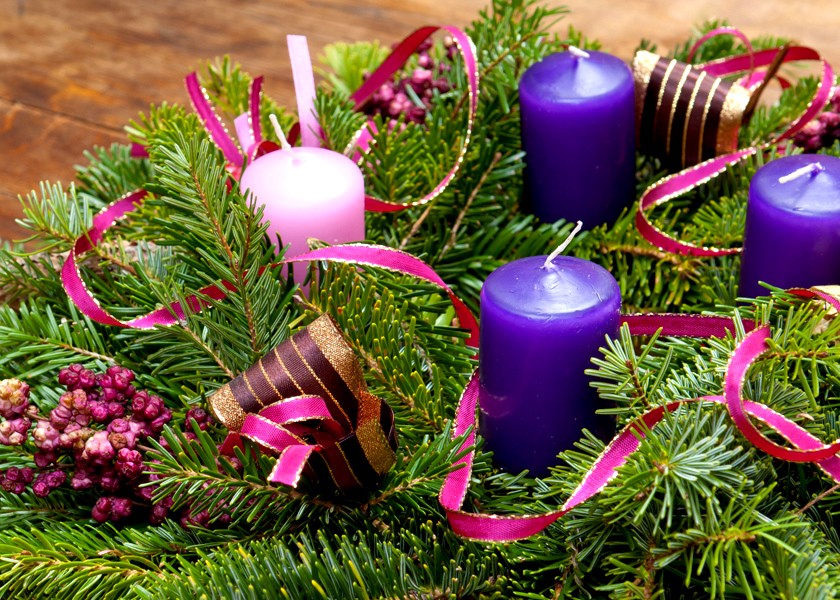
During the holidays, nativity scenes and Christmas trees decorate most Catholic homes, but what about Advent wreaths?
Advent wreaths are traditionally made from evergreen branches and have four candles. The four candles represent the four weeks of Advent—three candles are purple, and one is a rose color.
The purple represents prayer, penance, and preparation for the coming of Christ. Historically, Advent was known as a “little Lent,” which is why the penitential color of purple is used. During Lent, we prepare for the resurrection of Christ on Easter. Similarly, during Advent, we prepare for the coming of Christ, both on Christmas and at the second coming.
The rose candle is illuminated on the third Sunday of Advent, known as Gaudete Sunday. At Mass on the third Sunday, the priest will also wear rose colored vestments. Gaudete Sunday is a day for rejoicing and joy as the faithful draw near to the birth of Jesus, and it marks the midpoint of Advent.
“The progressive lighting of the candles represents the expectation and hope surrounding our Lord’s coming into the world and the anticipation of his second coming to judge the living and the dead,” says the USCCB.
During the Advent season, the faithful will also notice a common theme in the Gospel readings. The readings focus on preparation or “making straight the path of the Lord,” penance, and fasting. All of these things remind us of the importance of preparing our hearts for the Lord and making room for his presence in our lives.
Did you know?
The Advent wreath originated from a pagan European tradition, which consisted of lighting candles during the winter to ask the sun god to return with his light and warmth.
The first missionaries took advantage of this tradition to evangelize to people and taught them that they should use the Advent wreath as a way of preparing for Christ’s birth, and to celebrate his nativity and beg Jesus to infuse his light in their souls.
The circle of the Advent wreath is a geometric figure that has neither a beginning nor an end. It reminds us that God does not have a beginning or an end either, which reflects his unity and eternity. It is a sign of the unending love that the faithful should show the Lord and their neighbors, which must be constantly renewed and never stop.
The green color of the wreath represents hope and life. The Advent wreath reminds us that Christ is alive among us, and that we must cultivate a life of grace, spiritual growth, and hope during Advent.
Bless your Advent wreath
The blessing of an Advent wreath takes place on the First Sunday of Advent or on the evening before the First Sunday of Advent.
When the blessing of the Advent wreath is celebrated in the home, it is appropriate that it be blessed by a parent or another member of the family.
To bless your Advent wreath at home, follow our guide, “How to bless your Advent wreath at home.”
Source: Licas Philippines
0 Comments